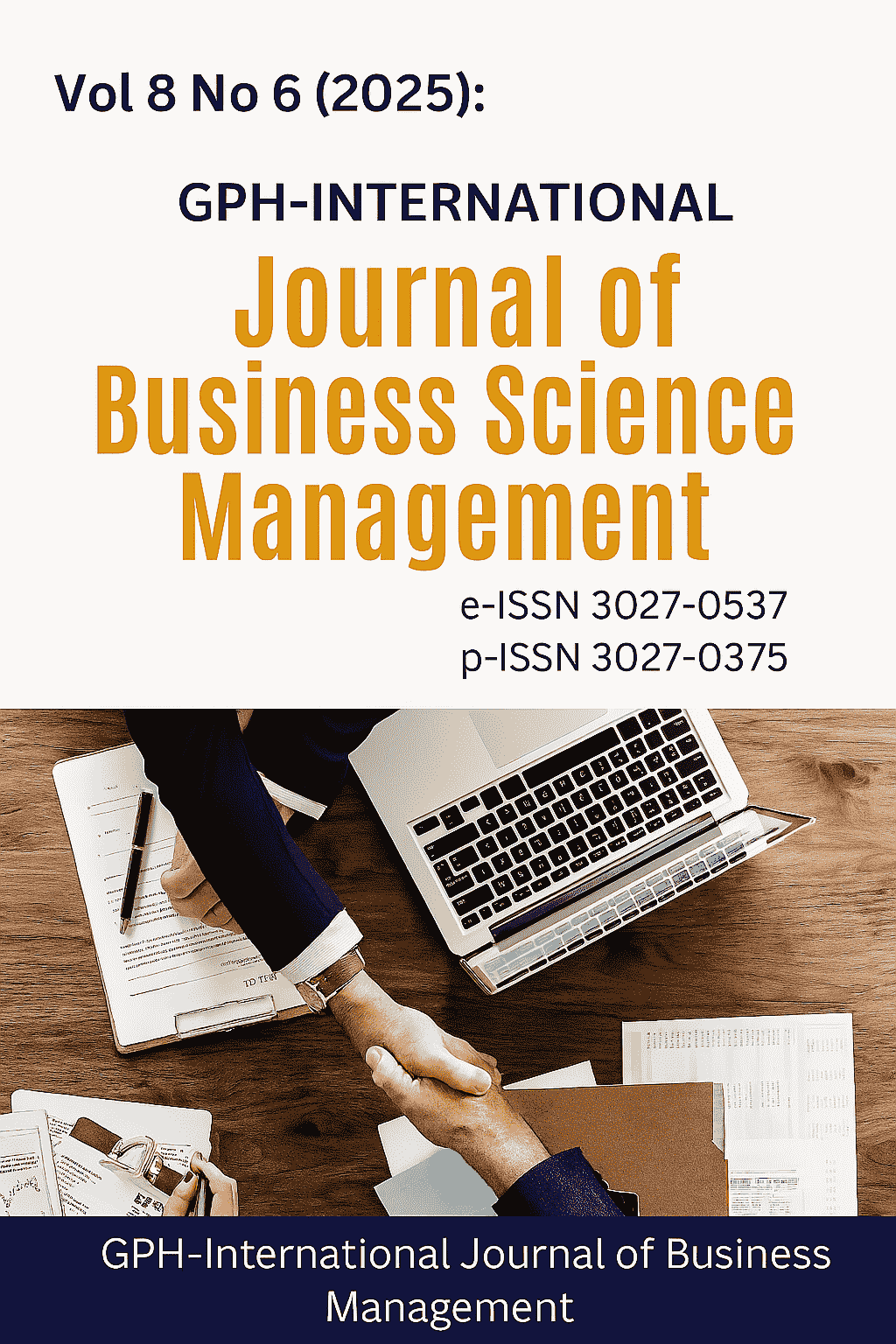EMPLOYEE RESISTANCE TO ORGANIZATIONAL CHANGE: CAUSES AND STRATEGIC INTERVENTIONS IN NIGERIA HOSPITALITY INDUSTRY
Abstract
The hospitality industry in Nigeria is undergoing rapid transformation driven by technological advancement, shifting consumer preferences, and increased competition. While organizational change has become essential for operational efficiency and market relevance, it is frequently met with resistance from employees—the key implementers of such change. This study explores the underlying causes of employee resistance to organizational change and evaluates strategic interventions within Nigeria’s hospitality sector. Grounded in Lewin’s Change Management Theory (Unfreeze–Change–Refreeze), the research adopts a qualitative approach using semi-structured interviews with 20 employees across various hospitality organizations. The findings reveal that resistance stems from factors such as fear of job loss, inadequate communication, lack of employee involvement, and poor leadership engagement. Strategic responses, including inclusive communication, participatory decision-making, and targeted training, were found to mitigate resistance and enhance change readiness. The study contributes to the limited empirical literature on change resistance within the Nigerian hospitality context and offers practical insights for managers and policymakers aiming to implement sustainable change initiatives. Implications for theory, practice, and future research are also discussed.
Downloads
References
Alkhoori, I. (2022). A critical review of change management and technology adoption factors to drive organisational performance: A study of the Abu Dhabi national oil company (ADNOC). Liverpool John Moores University (United Kingdom).
Amarantou, V., Kazakopoulou, S., Chatzoudes, D., & Chatzoglou, P. (2018). Resistance to change: An empirical investigation of its antecedents. Journal of Organizational Change Management, 31(2), 426-450.
Amjad, A., & Rehman, M. (2018). Resistance to change in public organization: Reasons and how to overcome it. European Journal of Business Science and Technology, 4(1), 56-68.
Appelbaum, S. H., Degbe, M. C., MacDonald, O., & Nguyen-Quang, T. S. (2015). Organizational outcomes of leadership style and resistance to change (Part Two). Industrial and Commercial Training, 47(3), 135-144.
Bagnaresi, D., Barbini, F. M., &Battilani, P. (2021). Organizational change in the hospitality industry: The change drivers in a longitudinal analysis. Business History, 63(7), 1175-1196.
Bateh, J., Castaneda, M. E., & Farah, J. E. (2013). Employee resistance to organizational change. International Journal of Management & Information Systems (Online), 17(2), 113.
Belias, D., &Trihas, N. (2022, September). How can we measure “resistance to change”? An exploratory factor analysis in a sample of employees in the Greek hotel industry. In International Conference of the International Association of Cultural and Digital Tourism (pp. 51-66). Cham: Springer Nature Switzerland.
Benhadda, L., &Chibili, M. N. (2019). Managing change in the hospitality industry. In Modern Hotel Operations Management (pp. 508-565). Routledge.
Buhalis, D., Harwood, T., Bogicevic, V., Viglia, G., Beldona, S., & Hofacker, C. (2019). Technological disruptions in services: Lessons from tourism and hospitality. Journal of Service Management, 30(4), 484-506.
Cameron, E., & Green, M. (2019). Making sense of change management: A complete guide to the models, tools and techniques of organizational change. Kogan Page Publishers.
Chandler, N. (2010). Reasons and forms of organizational resistance to change in the higher education sector. Practice and Theory in Systems of Education, 5(1), 87-104.
Charmaz, K. (2006). Constructing grounded theory: A practical guide through qualitative analysis. SAGE Publications.
Costa, T., Calisto, M. D. L., Rosário, J. F. D., & Severino, F. (2023). SHIFT & Inspire: Tourism & Hospitality Trends.
Creswell, J. W. (2012). Qualitative inquiry and research design: Choosing among five approaches. SAGE Publications.
Dent, E. B., & Goldberg, S. G. (1999). Challenging “resistance to change.” The Journal of Applied Behavioral Science, 35(1), 25-41.
Dibia, N. J. (2017). Exploring the strategies adopted to overcome employee resistance to change in the telecommunications sector in Lagos, Nigeria. Colorado Technical University.
Dutta, I. (2024). Adapting to change: Exploring contemporary issues in the tourism and hospitality industry. International Journal of Advanced Academic Studies, 6(9), 1-6.
Dworkin, S. L. (2012). Sample size policy for qualitative studies using in-depth interviews. Archives of Sexual Behavior, 41(6), 1319-1320.
Equenot, T. (2024). Change management dynamics applied to the fast-evolving luxury hotel industry (Master's thesis).
Fugate, M. (2012). The impact of leadership, management, and HRM on employee reactions to organizational change. In Research in Personnel and Human Resources Management (pp. 177-208). Emerald Group Publishing Limited.
Juneja, P. (2020). Kurt Lewin’s change management model: The planned approach to organizational change. Management Study Guide. https://www.managementstudyguide.com/kurt-lewins-change-management-model.htm
Kaufman, H. (2017). The limits of organizational change. Routledge.
Kim, J., Hardin, A., & Lee, S. (2023). Factors influencing resistance to hospitality information system change. Journal of Hospitality and Tourism Insights, 6(5), 1926-1945.
Kulkarni, V. (2016). Employee interpretations of change: Exploring the other side of the resistance story. Indian Journal of Industrial Relations, 246-263.
Lewin, K. (1951). Field theory in social science. Harper and Row.
Oliver, D. G., Serovich, J. M., & Mason, T. L. (2005). Constraints and opportunities with interview transcription: Towards reflection in qualitative research. Social Forces, 84(2), 1273-1289.
Ohunakin, F., Adeniji, A. A., Oludayo, O. A., Osibanjo, A. O., &Oduyoye, O. O. (2019). Employees’ retention in Nigeria’s hospitality industry: The role of transformational leadership style and job satisfaction. Journal of Human Resources in Hospitality & Tourism, 18(4), 441-470.
Pihlak, Ü., & Alas, R. (2012). Leadership style and employee involvement during organizational change. Journal of Management & Change, 29(1).
Radwan, H. R. I. (2022). Factors influencing the implementation of organizational change management in large Egyptian hotels: Mediating effects of employee engagement. The International Journal of Tourism and Hospitality Studies, 3(2), 77-103.
Ramos-Maçães, M. A., & Román-Portas, M. (2022). The effects of organizational communication, leadership, and employee commitment in organizational change in the hospitality sector.
Sawagvudcharee, O., &Limpabandhu, B. (2019). Understanding the multifaceted dynamics of organizational change within the hospitality industry. ABAC Journal, 39(1).
Welsh, E. (2002). Dealing with data: Using NVivo in the qualitative data analysis process. Forum Qualitative Sozialforschung / Forum: Qualitative Social Research, 3(2).
The authors and co-authors warrant that the article is their original work, does not infringe any copyright, and has not been published elsewhere. By submitting the article to GPH-International Journal of Business Management, the authors agree that the journal has the right to retract or remove the article in case of proven ethical misconduct.




























